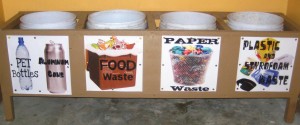Last week, Jesuit schools met to reconcile with creation at the new high school campus in Iloilo City (Western Visayas, Philippines). The Philippine Jesuits has a definite commitment to ecological responsibility and our institutions, with our schools sharing in this. We recognize that our work ethic and lifestyles are the biggest communicators of our environmental accountability and not just simply on what we teach.
Our attitudes along with our formal education account for much of how we impact on others and on creation. We must, at the same time internalize what we teach, both how Jesuits are formed and how we form those working with us and studying in our educational institutions. Once we have established capacities in these areas, we have greater credibility to engage in the broader areas of environmental awareness and responsible resource use.
All of this begins not as a burden but from a deep experience of gratitude to God and for all of his creation.
A group of 47 participants from elementary and secondary Ateneo schools listened to Pedro Walpole talk about the importance in the Jesuit tradition of beginning with gratitude. Sharing their reflections on how we need to go below the surface of awareness: Bong spoke of the challenge on ecological conversion. Emmanuel Gomez from Cagayan de Oro spoke of the great work the science club is doing but recognize the need to connect with others. Tony Lumactod from Davao spoke of the importance of using the first week of the Spiritual Exercises for deepening the sense of gratitude. Fr. Kit Bautista put the challenge to us of the need for an integrated approach and programming that means it gets into the system and life of the schools.
The emerging discussion provided much material for deeper reflection that could drive the growing engagement and future recollection for administrators. During a work session, using a basic checklist, people admitted the limited comprehension they had of the total picture and the need for more concerted effort and a program of learning. Modules of environmental care can be organized; visits to green schools can be a learning experience. Other things shared included not only exposure to upland and coastal communities but engagements for children so they understand the ecological roles of these communities. If communities are properly supported to sustain ecological services, with their basic needs met and opportunity to engage in society is ensured, a true binayloy or eucari is established.
Culturally we discussed the importance of grandparents in being with the children in caring for the environment and knowing how to take time and experience its wonder and support all through life. A self-imposed tax on flights and a percentage of takings for the use of facilities could contribute socio-environmental support were suggestions for connecting our lives with creation.

People who might be able to focus attention on this work include not only the science teachers and plant managers but also campus ministry, policy developers and youth leaders, without forgetting that all are called. Serious will to sustain efforts on and off campus is critical.
As Fr. Johnny Go shared: Perhaps space and time in school life presents the most practical challenge. And time will tell, if we have been generous enough to take this up in gratitude and love of all life.


